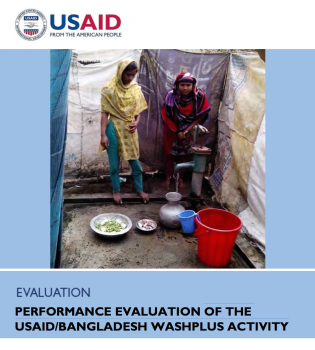The water, sanitation, and hygiene (WASH) situation in the southwestern region of Bangladesh is particularly challenging given the prevalence of flooding, water and soil salinity, river erosion, and cyclones. The USAID/Bangladesh WASHplus Activity (“WASHplus”) addresses access, practices, and health outcomes related to WASH. Implemented between March 2013 to September 2015 in Bangladesh by FHI 360 and WAB Bangladesh (WAB), WASHplus aimed to address the lack of access to safe drinking water, improved sanitation systems, and basic hygiene education in the southwestern region. WASHplus was implemented in four remote upazilas, Daulatkhan and Char Fasson in the District of Bhola, and Kalapara and Galachipa in the District of Patuakhali. These upazilas were targeted given their poverty status, number of people without access to safe drinking water, number of people without access to improved sanitation facilities, remoteness of the region, prevalence of water-borne illnesses, and lack of other major WASH actors.
Bangladesh was one of seven countries supported by the WASHplus Supportive Environments for Healthy Communities Project. This multi-year Cooperative Agreement (2010-2016) supported healthy households and communities by creating and delivering interventions that lead to significant improvements in access, practices, and health outcomes related to water supply, sanitation, and hygiene (WASH) and household air pollution (HAP). WASHplus also had programs Benin, Kenya, Madagascar, Mali, Uganda, and Zambia.


